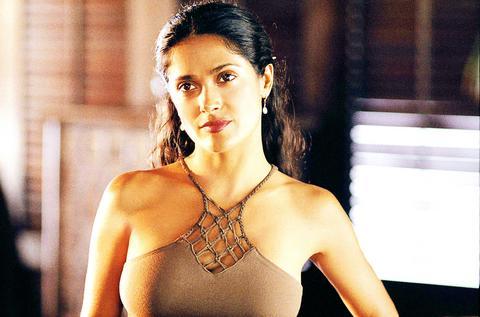You'd have to search high and low to find screen lovers with less romantic chemistry than Pierce Brosnan and Salma Hayek in After the Sunset, a jewel-heist frolic so stale it feels like a retread of a retread.
A lot of putatively steamy nuzzling goes on between Brosnan's character, Max Burdett, a master jewel thief who specializes in concocting airtight alibis, and his partner-in-crime, Lola Cirillo (Hayek). Watching these two mash faces is like observing an uncomfortable dental procedure. The mask and latex gloves may be absent, but the actors convey the sense of two professionals gamely enduring an ordeal.

PHOTO COURTESY OF FOX MOVIES
Brosnan has finally reached the age of flab, and the sight of Hayek's extravagant cleavage spilling over his hairy paunch isn't especially pretty. With Brosnan, the line between sly and stony has always been precarious. Here, the most reliable James Bond since Sean Connery seems so buttoned-up and bored he can't even be bothered to raise an eyebrow.

PHOTO COURTESY OF FOX MOVIES
After a slam-bang opening, in which they wrest a priceless diamond from Stan Lloyd (Woody Harrelson), the FBI agent assigned to Max's case, by trapping him in a limousine driven by remote control, After the Sunset never regains its momentum. The next thing you know, Max and Lola are living unhappily ever after in a tropical paradise, secure with enough ill-gotten wealth to last a lifetime and relying on sex, fine wine and ocean views to keep their lives exciting.
As Max gazes out at the sunset from their perfect beach cottage, he is overcome with that nagging is-that-all-there-is feeling. Despite the movie's drooling vision of cloudless afternoons and golden twilights mellowed by cocktails festooned with little umbrellas, you can sense how deadly it would be to while away your days with nothing to do but massage your indolence.
Rescue from ennui arrives in the nick of time when a gigantic cruise ship carrying a bauble billed as the Third Napoleon Diamond slides into port. Stan also appears, assuming that Max and Lola are still in the jewel-thief business and have plans to get it. His arrival only whets Max's appetite to resume his career and turn on his adrenaline spigots, despite his promise to Lola to retire from the business.
Max is further prodded back into action by the local crime boss, Henry Moore (Don Cheadle), a Detroit gangster who has relocated to the Caribbean and enlists him as a co-conspirator. The undeveloped role is a thankless throwaway for Cheadle, who deserves better.
Harrelson, an actor who has never shown he has an adrenaline shortage, lends After the Sunset what little life it stirs up. Like all his screen characters, his Stan behaves like a wild-eyed maniac with a spark plug implanted in his head. When he teams up with Sophie (Naomie Harris), the smoldering local constable, the fire that's missing in Brosnan's and Hayek's dental appointments flares up.
As Max and Stan's tricky cat-and-mouse game does triple somersaults, it becomes obvious that the male stars' roles should have been reversed. Harrelson's revved-up motor is the kind of machine that kicks itself into action and demands crazy challenges, while Brosnan's is a sedate little putt-putt requiring a lot of effort to make it start. The scheme engineered by Max takes place during a midnight scuba-diving expedition. It is as dull as it is elaborate.
Even by the fanciful rules of caper comedies, After the Sunset directed by Brett Ratner (Rush Hour), is a fraudulent entertainment. Except for the opening chase, its action sequences are strictly routine, and the overall tone strains after a wit and style that appear far beyond Ratner's grasp.

June 2 to June 8 Taiwan’s woodcutters believe that if they see even one speck of red in their cooked rice, no matter how small, an accident is going to happen. Peng Chin-tian (彭錦田) swears that this has proven to be true at every stop during his decades-long career in the logging industry. Along with mining, timber harvesting was once considered the most dangerous profession in Taiwan. Not only were mishaps common during all stages of processing, it was difficult to transport the injured to get medical treatment. Many died during the arduous journey. Peng recounts some of his accidents in

“Why does Taiwan identity decline?”a group of researchers lead by University of Nevada political scientist Austin Wang (王宏恩) asked in a recent paper. After all, it is not difficult to explain the rise in Taiwanese identity after the early 1990s. But no model predicted its decline during the 2016-2018 period, they say. After testing various alternative explanations, Wang et al argue that the fall-off in Taiwanese identity during that period is related to voter hedging based on the performance of the Democratic Progressive Party (DPP). Since the DPP is perceived as the guardian of Taiwan identity, when it performs well,

The Taiwan People’s Party (TPP) on May 18 held a rally in Taichung to mark the anniversary of President William Lai’s (賴清德) inauguration on May 20. The title of the rally could be loosely translated to “May 18 recall fraudulent goods” (518退貨ㄌㄨㄚˋ!). Unlike in English, where the terms are the same, “recall” (退貨) in this context refers to product recalls due to damaged, defective or fraudulent merchandise, not the political recalls (罷免) currently dominating the headlines. I attended the rally to determine if the impression was correct that the TPP under party Chairman Huang Kuo-Chang (黃國昌) had little of a

At Computex 2025, Nvidia CEO Jensen Huang (黃仁勳) urged the government to subsidize AI. “All schools in Taiwan must integrate AI into their curricula,” he declared. A few months earlier, he said, “If I were a student today, I’d immediately start using tools like ChatGPT, Gemini Pro and Grok to learn, write and accelerate my thinking.” Huang sees the AI-bullet train leaving the station. And as one of its drivers, he’s worried about youth not getting on board — bad for their careers, and bad for his workforce. As a semiconductor supply-chain powerhouse and AI hub wannabe, Taiwan is seeing